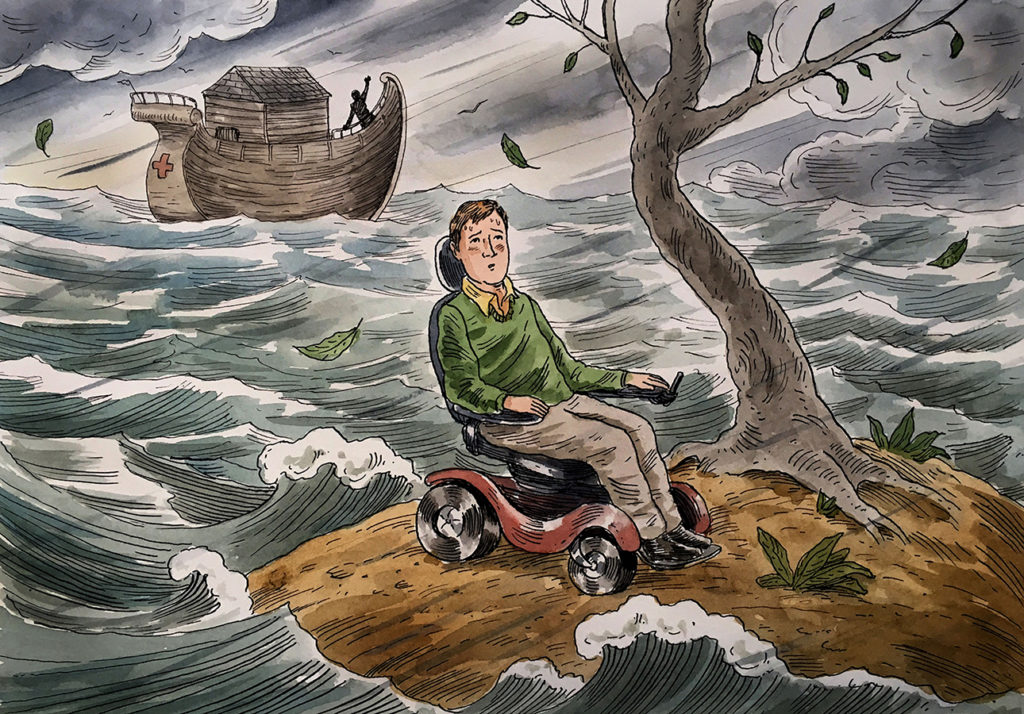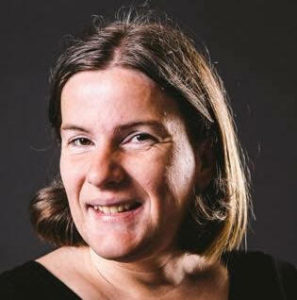Climate Change and the Disability Angle
By April Wick, Executive Director of Resources for Independent Living
I remember how excited my husband and I were when it snowed in Eugene, OR two years ago. We had just moved to Oregon from Berkeley after I accepted a position there, and Eugene was experiencing a very rare instance of significant snowfall. We were like kids, pushing ourselves outside in our wheelchairs and sticking our tongues out to feel the first flakes. The scene outside our apartment window was bucolic as the flakes gathered and made beautiful icicle sculptures on the tree branches. We had adopted a puppy the day before and were dreaming of play dates frolicking in the snow with her.
That was day one.
By day three our excitement turned to frustration as we became homebound in our apartment due to snow accumulation and ice. When our maintenance man kindly dug a path for us to the elevator, we did not get very far. Despite living less than two blocks from Starbucks and four short blocks from my office, the sidewalk conditions made it unsafe to go anywhere. That week we learned the importance of community as we relied on co-workers and neighbors for groceries and rides to appointments.
We look back on this experience as disabled individuals dealing with this weather event with humor, but it also got us thinking about the bigger picture of climate change, disability, and how communities can plan around supporting resiliency of communities disproportionately affected by climate change. Disabled people make up at least 15% of the population (source World Institute on Disability), and yet the disability angle is rarely mentioned in discussions about climate change. When extreme weather events occur such as heat waves, floods, or fires people with disabilities are often portrayed in the media as obvious victims of their situation, rather than highlighting systemic issues related to disability and disaster response.
There are a few ways that society can change the narrative around people with disabilities and climate change. First, people with disabilities need to be at the table where discussions about climate change and disaster response are made. By including people with lived experience at the table, officials can make more informed decisions about what strategies will work. Second, government agencies and private companies should seek out collaborative partnerships with community organizations specializing in building the capacity of disabled communities. These partnerships can lead to more comprehensive disaster planning and response efforts. Third, individuals with disabilities should be viewed as capable of resiliency in the face of climate change and disaster events. Efforts should be made to provide training and preparedness tools to disability communities.
Of course, the discussion of how to lessen the impact of climate change on people with disabilities is not just about building an effective disaster response and resiliency model. We also must have bold conversations about the kind of community we want to live in. We must not ignore the connection of climate change to issues of public health, food scarcity, and economic struggle. By focusing efforts around designing affordable and accessible communities, we are taking a proactive approach to minimizing the effects of climate change on all of us, including people with disabilities.
(For more information on how climate change impacts people with disabilities, I encourage you to check out the World Institute on Disability’s New Earth Disability project at www.wid.org)


